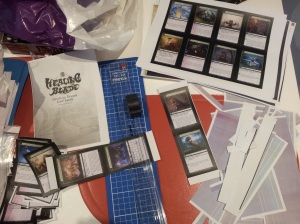A while ago I read a tweet http://researchblog.iclon.nl/phd-side-quests-teaching/ likening various distractions (like teaching) to a side quest in a multiplayer online game. Even though I’m part time on my PhD and full time teaching, I find this tweet still resonated with me. At present I feel very stretched- full time academic teaching load, additional (short term) administrative role, part time PhD student, and Mum- it’s always busy and every minute is precious in each role. When I do have blocked time for my PhD analysis and writing I feel like if I am not writing actual words into a chapter that somehow I am not working effectively enough, then I realised I had to change my personal PhD narrative if I was going to do this to the best of my ability. Let me explain…
A few weeks ago I was up to day 5 of what would be a 2 week lack of motivation for my studies. I felt tired, overwhelmed and frustrated that this sacred writing time was being wasted while I looked up new references, read over old data and tried to re-envision my literature review while writing a data chapter. I was thinking about changing the chapter structure of the thesis to follow themes rather than data sets, this was going to be a huge shift. There was textas, A3 paper, muttering and scribbling. Mendeley was getting a workout as I uploaded and annotated more articles. I was busy, but didn’t feel like I was making progress visible to anyone else. I briefly considered walking away from the PhD- but am so close to being finished I know I would regret it. By day 5 I realised the truth- I was caught up in a side quest! As my thesis links to games, learning and aspects of motivation, I realised I was living the kinds of scenarios I had been researching for the last few years; what motivates a person to push past this point, where it all seems too hard to manage? I looked to my data, and my own personal side quests- my craft and other blogs. If you follow these blogs : one mad tatter and My WISE Dolls, you may notice that my whole life in recent years is chipping away at various goals over a longer period of time. It isn’t about being motivated to complete a project in one day, and my thesis is another such project. I realised that I needed to be my own advocate, and so I gave myself permission to just be- to leave the actual writing of my chapter for a few days and go on a side quest of reading and thinking. This took me another week or so, but after this time I felt again in a position to edit and write some more. Last week I sent the finished chapter to my advisory group for feedback- and it felt like an epic win!
The side quest was an important part of the journey, of narrowing down the new articles to those that could be used to support my data and the unfolding story in my thesis. The ‘re-envisioning’ of the thesis was also deemed a side quest, confirming that the chapter structure I have drafted over the last 2 years will work better for my thesis than the one in my clouded mind a few weeks ago. While these two processes didn’t make a visible difference to my writing and work so far, they have helped me to think through my options and make firm choices on the direction of my thesis, and so this clarity of mind makes the side quest worthwhile in my opinion. The PhD is as much about the thinking, pondering and analysing as it is about the written submission. I need to wander down some of the pathways to realise they are dead ends. And, even if I don’t feel like writing, there are lots of tasks to to that will contribute in different ways to the completed submission.
Some side quests might be setting up fonts, highlighting relevant data, creating images and labelling figures- they are important small tasks that support the end goal. These are what help build the thesis from the ground up, and no one else can do it for me; I have to own the whole quest, not just the fun bits 🙂 I need to remind myself of the work I have been doing towards this since 2011, for all intents and purposes I have done the hard yards; the planning, considering methodological protocols, completing ethics for university and education departments, approaching schools, and building relationships with principals, teachers and students in order to generate data on site. I have the conceptual framework in place and have identified the gaps in the research my study seeks to contribute to. I have come a long way in my writing and thinking, been supported by a fabulous team of family, friends and colleagues and really love my topic. With less than a year to go until submission, I need to remind myself “I’ve got this!” 🙂
I still need to recognise that some side quests are time sinks, and wont be helpful in the bigger scheme of things for the PhD goal. For example, my WISE Dolls site is exciting and will be great, but it doesn’t need to be the focus of my energy this year, it will be waiting for me to pick it up again next year. The same with some of my tatting design ideas and goals, these too will wait until I am on the other side of thesis submission. In recognising these as alternate side quests I can more easily make a clear decision to refocus my precious PhD time to the side quests really need my focus here and now.



